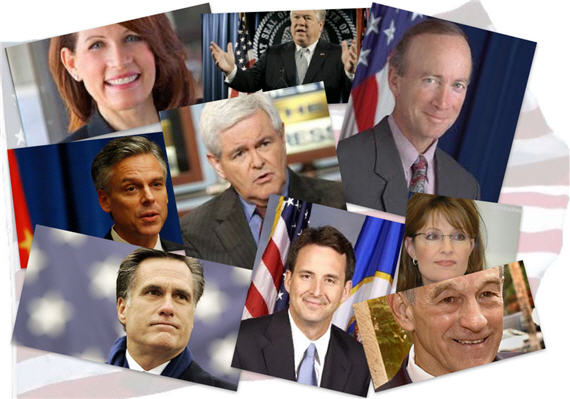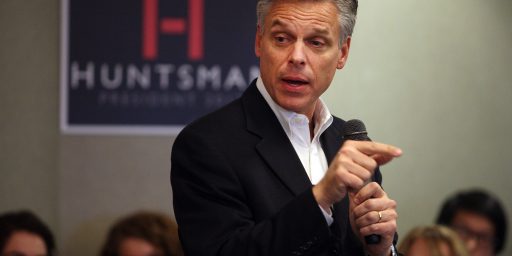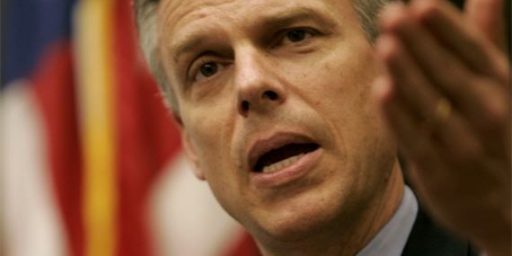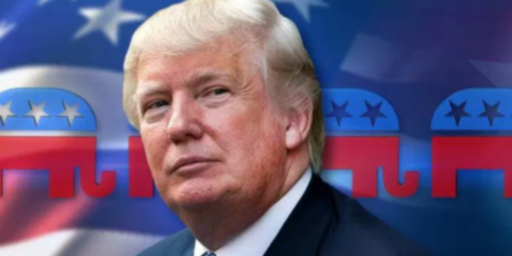Why 2012 Republican Field is So Weak
The Republican candidates of 2012 are so weak because of GOP losses in 2004 and 2006 Senate and gubernatorial races.
Mark Greenbaum asks “Why Is the GOP Presidential Field So Terrible?” He offers an interesting theory in answer:
It was the decimation of the national Republican leadership roster, thanks to Senate and gubernatorial losses in 2004 and 2006, that has deprived the party of viable contenders.
When it comes to presidential politics, the reality is that fields are generally set years before an actual election, as good nominees must have calibrated experience combined, critically, with impeccable timing. Politics geeks know about the 14-year presidential “freshness test,” which postulates that a candidate who has been around for too long is unlikely to ascend to higher office, as voluminous records create excessive baggage and older candidates who are professionally long in tooth but have trouble with voter appeal. (Consider the last four losing presidential candidates.)
Yet the freshness test stands somewhat incomplete, particularly in our media-saturated political climate, which can accelerate a politician’s career decline. Indeed, to win a presidential election, in addition to having an appealing, electable personality, a candidate should meet three key criteria: be of the right age (the sunnier side of 60, or close to it), come directly from the right office (Senate, governorship, or vice presidency), and have been elected last within a certain window (reasonably, within four to six years of the presidential race). There have been exceptions to these rules, like Ronald Reagan and Lyndon Johnson, but they are increasingly rare today. And these criteria can explain why the Republicans are struggling to find a real 2012 contender.
Excluding Gingrich and Ron Paul (who both arrived in Washington in 1979), the entire Republican field is actually relatively young (or, in Mitt Romney’s case, looks young), so the first criterion isn’t the issue. The problem for Republicans, rather, is that most of the people already in the fold or seriously being discussed as potential candidates—Gingrich, Romney, Tim Pawlenty, Rick Santorum—aren’t sitting elected officials. They’re retreads several years out of office and past their prime window; meanwhile, few others with the right credentials are waiting in the wings. (Michele Bachmann, for instance, doesn’t ring serious and also sits not in the Senate but in the House.)
Why are there so few potential Republicans candidates currently in office? The reason can be traced back to the 2004 and 2006 election cycles, which upended the GOP’s national bench. In 2006, when 36 governorships were up for grabs, Republicans elected just four new executives: Charlie Crist in Florida, Jim Gibbons in Nevada, Sarah Palin in Alaska, and Butch Otter in Idaho. Only the ultra-conservative Otter won reelection. (While Gibbons was toppled for broad incompetence and Palin quit in the middle of her term to become a celebrity, Crist probably had good national potential, but he was ousted for perceived centrist apostasy.) The Senate side was even worse for the GOP, as just one new senator was elevated: Bob Corker of Tennessee, a relative moderate (in today’s Republican caucus, at least) who pointedly refused a national run this year.
The 2004 elections were admittedly stronger for Republicans, as they elected seven new senators, of which six still serve. But this group is made up mostly of southerners and searing right wingers with limited national appeal, including Tom Coburn, Jim DeMint, and David Vitter. More important were the governor’s races, but, out of eleven offices up for grabs, Republicans elected only three new executives, just one of whom is still in office: Mitch Daniels, a figure many conservatives are now understandably pushing to run. (Potential nominee Jon Huntsman also won in 2004 and was reelected, but he quit to take a position in the Obama administration. As a result, the talented Huntsman has almost no chance of winning the Republican primary.)
It’s an interesting and plausible argument. And it’s actually applicable to the last five losing presidential candidates, with 68-year-old incumbent President George H.W. Bush, who’d been in the national spotlight since the Nixon administration, losing to 46-year-old Bill Clinton, who’d emerged out of relative obscurity just four years earlier.
Romney’s a plausible president but he’s been on the shelf now since January 2007–that’ll be almost six years by the time we vote next November. And he’ll turn 65 during the primaries. By Greenbaum’s reckoning, his best shot was in 2008 and he didn’t make it.
Pawlenty is in that boat this year, having only just finished eight years as Minnesota governor in January. And he’s a relative spring chicken at 50. At first blush, though, he doesn’t seem very charismatic or have a compelling story as to why he should be president.
Daniels seems to be the favorite of Establishment Republicans and Huntsman the favorite of the political reporters. But both are extreme longshots seemingly running for 2016. Which may not be such a bad thing, as Greenbaum thinks the GOP has a much better shot then:
But, as bad as it may look for Republicans, they can take heart in the future. In the 2010 midterms, the GOP elected 13 new senators and 17 new governors, of whom ten and twelve, respectively, are under 60—an impressive split that doesn’t even include conservative stars Chris Christie of New Jersey and Bob McDonnell of Virginia, who were elected in 2009. By contrast, Democrats elected just three new senators and eight new governors last year, of which only five are under 60. 2012 is expected to be just as bad for the Democrats’ farm growth; the party will be hard-pressed to elect many new senators, and, while eight of the 11 open governor’s offices are currently Democratic, just five—Delaware, Missouri, New Hampshire, Vermont, and West Virginia—are favored to return Democrats. And it’s also not clear whether even these politicians will have the interest or national appeal to stage a national campaign. Indeed, if Republicans can’t beat Obama, 2016 will be their better bet for taking back the White House.
While there’s much truth in Greenbaum’s thesis, the fact of the matter is that candidate selection matters only at the margins. Americans tend to re-elect their presidents and Barack Obama is likable and a good campaigner, making him the heavy favorite. But the economy and other structural factors outweigh are by far the most important consideration in voters’ minds. Truly awful candidates can lose despite that–see, for example, Sharron Angle. But a Romney or Pawlenty or Daniels would almost certainly win if unemployment continues to hover around 10 percent.







Re-read the question Pawlenty flubbed. It wasn’t about “why”.
Even in context it doesn’t exactly show “fire in the belly” TG. It was a good moment to talk about important ideas and important constituencies.
And if the reporter tipped him toward self-absorption, that shouldn’t really play well. It should have been an “it’s not about me” moment.
Fourteen years?
Clinton, George W. and Obama all won the presidency on their first attempt.
Oh, I definitely agree it was a flub. It was a softball that you can easily redirect towards whatever talking point you want to emphasize that day. He blew an easy opportunity.
But the fact that he took the question literally and said he couldn’t pinpoint a precise moment? Not nearly as bad as saying you have no idea why you want to be president. What Mataconis is claiming he said would be huge and would stick around for the rest of his campaign. What Pawlenty actually said was a minor gaffe, easily forgettable.
Why is the Democrat field so weak in 2012?
Mainly because the presumptive candidate, Barack Obama, is the same person that has presided over continuous 9% unemployment, rising gas prices, lower housing values, rising food costs, declining dollar and increased foreign military involvement. This brings the vast majority of voters in the U.S. to believe the country is on the wrong track.
http://www.realclearpolitics.com/epolls/other/direction_of_country-902.html
Just as democrats in the Senate have been retiring to avoid the embarrassment of crushing defeats, without a spectacular turnaround of the economy, Obama is destined to a Carteresque loss. Liberals will be scrambling prior to their convention, when the handwriting on the wall will be crystal clear, to replace Obama with Hillary in the hope of salvaging the election.
54% Blame Bush Recession For Current Economic Problems, 39% Blame Obama
Poor wingnuts, they can’t get anything right.
@ponce: The test is “no president elected since Teddy Roosevelt has ever taken more than 14 years to transition from his first major office (governor, congressman, senator, mayor) to the Executive Branch (president or vice-president).”
Clinton was elected governor in 1978, so he was at the outer window of his 14 years in 1992.
Clinton was an exceptional case, though. He was an extraordinarily young governor and hadn’t been known on the national stage very long. He’d have been viable later.
Ponce,
Don’t let your fellow liberals know, but I’ve got it on good authority that George W. Bush will not be running for president in 2012.
There will be a candidate who is running on Bush’s platform of Gitmo, troops in Iraq and Afghanistan, the Patriot Act, wiretapping, signing statements and on and on.
That would be Barack Hussein Obama. Hmmm, Hmmm, Hmmm.
If I may, please;
Mr. Ron Paul for 2012.
America I beg of You. Look into Ron Paul’s issues. This guys is as genuine as they come. Mr. Ron Paul is the American system working, literally handing us the “right guy.”
Regan said, “what to ask is am I better off now than 4 years ago. Is food cheaper now than 4 years ago? Are taxes lower now than 4 years ago? Is the job situation better than it was 4 years ago?”
With Ron Paul’s 2012, it and they would be.
Constitutionally, legislatively, and morally, Ron Paul has no equal. His 22 year voting record speaks for itself.
Please research and find out for yourself. Listen to this guy talk.
Watch Dr Paul question Ben Bernanke if you doubt Paul understands even subtle aspects of the economy. Imagine Palin or Romney doing that?
Constitutionally, legislatively, and morally, Ron Paul has no equal. His 22 year voting record speaks for itself.
Please help give America back Her Constitution.
Ron Paul for Republican Nom and President in 2012
Thank You
James,
There’s a caveat to that test, that time serving as VP doesn’t count, which was necessary to get Nixon, Bush the Elder and (I believe) Truman within the 14 years. Such a bliffle factor implies the test is questionable to me.
No, but the Republicans will be trying to hold onto the House.
The Democrats have now pulled ahead in the generic Congressional poll for the first time in almost two years:
http://polltracker.talkingpointsmemo.com/contests/us-cong-generic-ballot
Perhaps America is holding the Republicans to all those promises they made about the economy last year.
@Moosebreath: It’s not that VP time doesn’t count it’s that getting to VP counts as a win. Raush says 14 years to get to VP or Prez. Which is reasonable enough, I guess–at that point you’re virtually assured of getting the nomination if you want it. And serving 8 years as VP shouldn’t count against you given the prestige factor.
I used to call him Slick Willy jr, because of the change slogan similarity during the campaign, In this one maybe I call him Dubya jr.
I do love OO0, Double O zero too,lol. how about OODub. Or is that racist because it could confuse calling him the second coming of the sneaky email reading phone tapping super spy Bush and a licensed to kill crack dealer?
@jwest
I’m pretty sure there will be at least two candidates running on that platform. But if the Republicans actually nominate someone who runs against those positions, I’d consider voting for him.
Anyway, the point is that it’s silly to suggest that voters will turn away from Obama on these issues when the Republican alternative will be no better.
I think the radicalization of the party has something to do with it, too, James. Anybody with a snowball’s chance in hell of getting elected is reluctant to throw his hat in because he knows the ordeal he’ll go through in the primaries.
This isn’t 2000, 1992, or 1980. Today the country is divided almost evenly among Democrats, Republicans, and independents. Both major parties have become increasingly radicalized and neither can muster the votes on their own to win a presidential election.
To do so you’ve got to win over independents. You may need to attract the partisan firebrands to get on the field but you need independents to go across the goal line.
Dave,
That’s been a concern for quite some time but it does seem to be coming to a head. In 2008, though, McCain and Romney, the two most moderate of the significant candidates, were the strongest finishers. (Huckabee technically passed Romney, but only by staying in the race for months after it was all but technically over while Romney dropped out in February.)
Romney appears to be the frontrunner this time. We’ll see how far he, or whoever the winner is, winds up tacking to the right to get the nomination.
My first thought was similar to Dave’s. Overall, the Republicans have been moving more and more to the right, with an especially radicalized base. Just look at how things like Fox News, Beck, internet sites, etc. have changed things on the right over just the last ten years. We’re starting to see products of that environment, and the primary process just encourages the more radical folks. I don’t see it getting any better in the future from that perspective. (And while the left has its blogs and TV shows, it’s not nearly as pervasive. The Democratic party is pretty moderate overall.)
The more I read comments by Hollowpoint, the more I’m convinced he and Ace went to the AMC dealership and bought matching, school bus yellow Pacers. They still have the Pros/Cons sheet of paper in the glovebox that they pull out whenever someone makes fun of them. The thing that put that put the Pacer on top of their list was the hip room measurement – it’s all there in black and white, with geometric precision.
They pick presidential candidates the same way. Trouble is, that’s not how people vote.
Palin is a red Ferrari.
Sorry about posting the wrong comment on this thread.
That’s what happens when you read other blogs.
@James:
but not until the GOP broke McCain as a moderate, and made him into a more radicalized candidate.
Surely moderate Republican “hopefuls” carry that lesson close to their hearts.
@Jay Tea:
I love this because it’s a current affairs exam. If you buy that, you gain entrance to teh stupid party.
For some commentators:
Bush Tax Cuts, Wars Major Drivers of Projected Government Debt
This is the kind of bologna that will get you a gig on a conservative web site. But it is simply not true. The Republican political behavior is extremely radical and unhinged. The Democrats focus on practical solutions to real problems.
Just because your guys have gone off the deep end is no reason to attribute the same craziness to others.
Come on, ken. Don’t you remember when Democrats had a filibuster-proof majority and they used it to ram through severe defense cuts, increases in taxes on the wealthy, legalized gay marriage, closed Guantanamo, reinstated Glass-Steagall, signed the Kyoto Protocol, pulled all troops out of Iraq and Afghanistan, and filed charges against all the war criminals of the Bush regime? No?
Oh, right. What they did with that filibuster-proof majority was to pass a healthcare bill that was supported by Republicans of the 90s. What radicals!
I think it would have played even better as “What they did with that filibuster-proof majority was to pass Romneycare.”
Billboard: “you’ve got the Romneycare, why not the Romneypresident?”